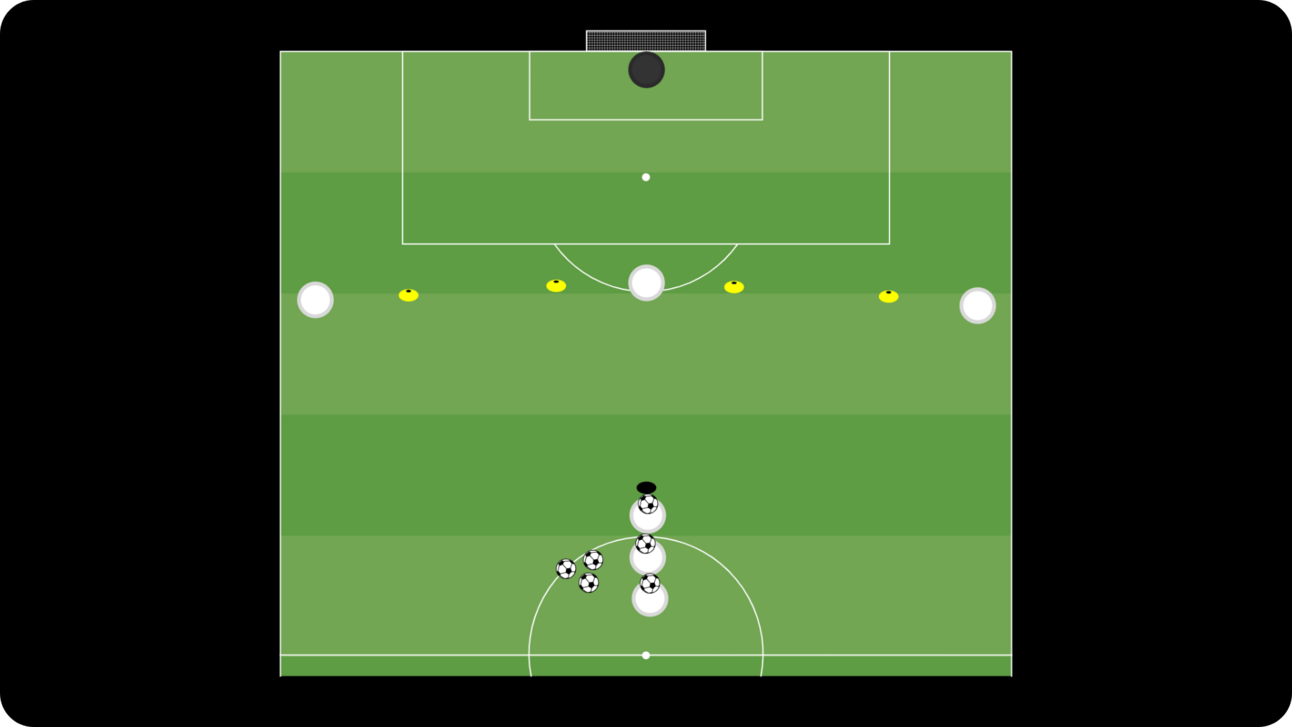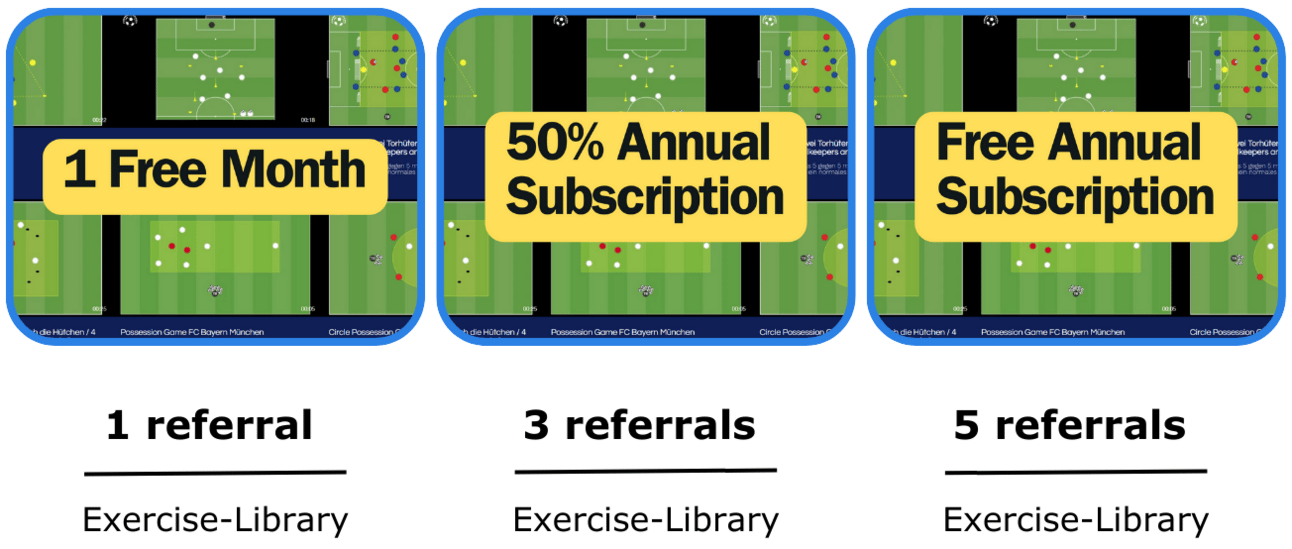In partnership with
Hello and welcome to the latest edition of our newsletter! In this issue, we’ll focus on the following topics:
⚽Talent in training, nerves in the game
👉5 New Drills!
🎁Quiz Contest: Win 2 KAEX Packs for Your Team!
⚽Talent in training, nerves in the game
As coaches, you’ve likely encountered situations where your team excels in training but struggles to perform in matches. Players appear frantic, anxious, and tense on the field, causing the potential you've witnessed during training sessions to seem completely absent. What causes this disconnect, and how can we, as coaches, help translate that “training performance” onto the pitch?
In this newsletter, we will explore why some teams can deliver strong performances in training yet falter in games. We’ll provide tips on how you, as coaches, can positively influence match performance and share insights from successful professional coaches on this topic.
The Challenge: Training and Matches Are Two Different Worlds for Many Players
In training, the environment is often more manageable: there are no loud fans, less pressure, and the focus is on improvement rather than results. This creates a space where players can feel relaxed and creative. In contrast, matches present a different scenario: the competition and tension put players under pressure to perform, leaving less room for mistakes.

A Common Pattern: In training, players demonstrate skill and confidence, but when it’s time to perform, their focus and attitude shift. Many fall into a pattern of nervousness and indecisive haste. This issue isn't limited to amateur teams; even at the professional level, coaches often face the challenge of players underperforming in crucial moments. The legendary coach Sir Alex Ferguson once said that a significant goal for coaches is to develop players who can maintain a clear head, even in the toughest situations.
1. Transferring the "Training Mindset" to Matches
Often, the problem lies in players focusing too much on the final outcome during matches, losing sight of what they should actually be doing on the pitch. How can we prevent this? One effective step is to simulate "competitive situations" in training. Top coaches like Jürgen Klopp and Pep Guardiola regularly incorporate intense competitive elements into their sessions to replicate the pressure and dynamics of real game situations. This approach helps players learn to remain calm and focused, even under heightened stress.

Practical Tip: Consider adjusting your training structure to incorporate more competitive elements and small “tournaments.” This could involve an intense 4v4 game with clearly defined victory conditions or a final game where there’s more at stake than just points in training. When players become accustomed to performing under pressure during training, the pressure they face in matches will feel less unfamiliar.
2. Focus on Processes, Not Just Outcomes
A key concept emphasized by coaches like Arsène Wenger and Thomas Tuchel is the “process-based” approach. When players concentrate too heavily on the final result, it often leads to increased anxiety. One effective strategy is to break the game down into smaller, manageable goals—objectives that help players stay focused on their performance rather than becoming overwhelmed by the outcome.
Practical Tip: Instead of saying, “We need to win,” a coach can emphasize focal points such as “Play accurate passes,” “Maintain defensive stability,” or “Always stay close to the ball.” This way, players won’t fixate on the bigger picture but will concentrate on what they can control in the moment. This type of mental focus on “small steps” helps alleviate anxiety and tension while boosting long-term confidence.
3. Fostering a Positive Culture Around Mistakes
A crucial factor in reducing nervousness is establishing a culture where mistakes are viewed not as disasters but as learning opportunities. A great example of this is Bayern coach Julian Nagelsmann’s approach with his players. Nagelsmann is known for analyzing errors after matches without criticizing players in front of the team. This approach promotes confidence and encourages players to take risks during the game.
Practical Tip: Actively encourage your players to “make mistakes.” Instill in them the confidence that errors are part of the process as long as they are trying to do the right thing and fully committing themselves. This approach often makes players feel more secure on the field, allowing them to enter the game with a more positive and relaxed mindset.
4. Establishing Specific Routines and Rituals for Game Day
Some professional coaches, such as former German national team coach Jogi Löw, swear by the power of rituals and routines on game day to reduce nervousness. Implementing consistent pre-game processes can help players clear their minds. These can include simple practices like specific warm-up routines, breathing exercises, or a brief team ritual in the locker room.

Practical Tip: Collaborate with your team to develop a small ritual that can be performed before every game. Whether it’s a handshake with each player, an encouraging phrase, or a breathing exercise, rituals create a sense of security and trust, helping to calm nerves.
5. The Role of the Coach: Instilling Ease and Trust
A often overlooked aspect is the emotional stability of the coach. Players closely observe their coach's body language and mood, and often the coach's nervousness reflects onto the team. Carlo Ancelotti, known for his calm demeanor on the sidelines, consistently emphasizes the importance of players having confidence in their abilities. Coaches can foster this confidence by remaining composed, even when things get hectic on the field.

Practical Tip: Maintain relaxed and positive body language during the game. Send the message that you trust your players, even in tight situations. This helps prevent any additional escalation of nervousness.
Conclusion
Translating training performance into matches is a challenge, but with the right techniques, you as coaches can significantly reduce players’ nervousness and help them remain focused and confident, even in difficult situations. By incorporating competitive scenarios in training, adopting process-based approaches, fostering a positive culture around mistakes, establishing consistent rituals, and maintaining a calm demeanor, you can enhance the likelihood of a liberated performance on the field.
👉5 New Drills!
5 new exercises are out. Get unlimited access to all existing and upcoming videos with our monthly or yearly subscription.
Drills:
🎁Quiz Contest: Win 2 KAEX Packs for Your Team!
Join Our Contest and Win Two KAEX Packs, Each with 24 Bags, Sponsored by Our Partner! All you need to do is complete our quiz accurately and in full.

Enter by Monday at midnight for your chance to win! If multiple participants answer all questions correctly, a winner will be selected at random and announced on Tuesday.
Surprise your team with 48 KAEX bags and boost their recovery!
P.S. For those looking to try KAEX: Subscribers to our newsletter can enjoy an exclusive 30% discount on your first order. Simply use the code “kaex-coaches” at checkout to redeem your discount.
Questions:
⚽Share Fussball Coaches Newsletter
Share our newsletter with friends and family to receive coupons for accessing our training library. 🎁👇
Here’s your unique link to share: {{rp_refer_url}}
{{rp_personalized_text}}
Check out our Homepage for exclusive training videos and products.
Was this post forwarded to you? Subscribe here.
Have an idea or feedback to share? [email protected]








